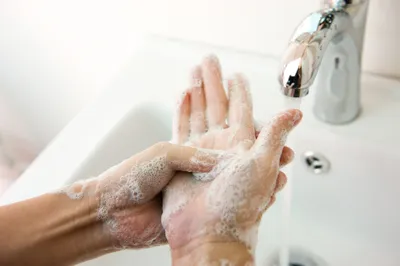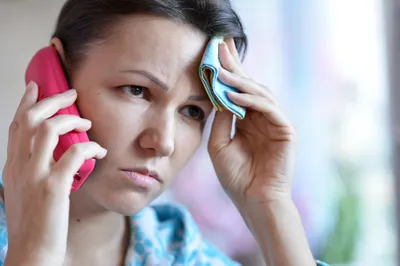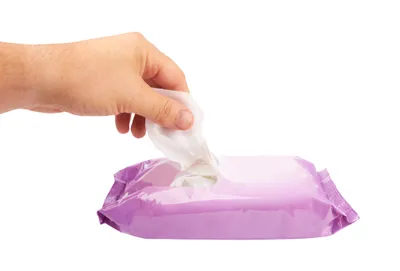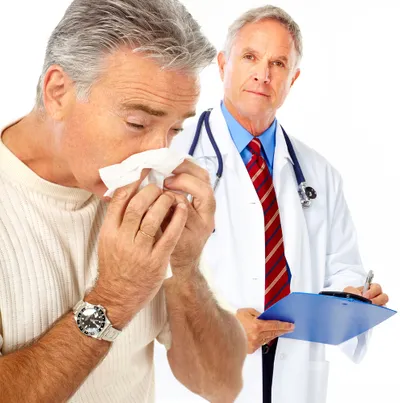You have a nasty, snotty, energy-sucking cold. However, you had a meeting you just couldn’t miss so you’ve dragged your sorry butt into work—with cough drops and two boxes of tissues in tow—of course.
Your colleagues are feigning admiration, but they’re keeping a safe distance from you and anything you touch. They’re probably wishing you hadn’t brought your germs to the workplace at all. Now you’ve potentially infected the whole office
Sound familiar? Many of us struggle with when it’s appropriate to go to work or into public with a cold. So we’re clearing the germs, with some social etiquette just in time for influenza season…
1. Stay Home For the First 3 Days After Infection
The first 3 days after you catch a cold are the most contagious, which means other people (your coworkers, family, classmates, and friends) have the greatest chances of catching your cold during this time frame). Do everyone a favor and stay at home. You can venture out after 3 days at home. Sure, you’ll still be showing the classic symptoms of a cold (i.e., coughing, sneezing, blowing your nose), but you’ll be less prone to pass it on to some innocent victim.
2. Sanitize Your Hands
One effective way to keep the germs at bay—or to prevent them for lingering on your work phone, computer keyboard, door handles, and so forth—is to wash or sanitize your hands frequently. That means any time you touch your face, blow your nose, eat, or cough into your hands. So do your part to keep others safe by soaping and scrubbing those hands frequently throughout the day.
3. Others Be Warned
Warn your family, coworkers, and friends that you are fighting a cold or influenza is a wise move during flu season. Even if someone else in your household has a cold, don’t chance infecting an unsuspecting victim. Give potential house guests the heads up as common courtesy.
4. Talk to Your Boss—On the Phone
Take the time to personally call your boss or school to explain that you are sick. Believe me; you’re doing everyone a favor by staying home if you’re not feeling well versus shutting your germy self into confined spaces with others to help prevent the spread of your flu.
5. Keep a Stash of Tissues Handy
No one likes a droopy, runny nose. It’s not attractive and using your hand or sleeve will just pass germs around. That’s why stashing tissues in your home, office, purse, pocket, and car for emergencies will let you cover your mouth quick if you cough or blow your nose if you’re drippy. I even stash travel packs of tissues in my laptop bag in case of emergencies.
6. Give That Sneeze the Elbow
By that I mean instead of sneezing into your hand, “gazoontight” into your elbow—a tucked away space that you’re not using to touch other things. When we sneeze into our hands, like many of us were taught as kids, we actually leave germs lingering all over our fingers, which we use to touch other things and others all day long.
7. Carry Sanitary Wipes
A stash of sanitary wipes (or baby wipes) will also come in handy when you have a cold. That way, if you do accidently cough, sneeze, or touch a shared surface with germy hands, you can immediately wipe off the desk or doorknob to avoid spreading germs further.
8. Cough Away From Others
Those itchy, stubborn coughs really have a knack of sneaking up on you. So do others a favor and always cough (and sneeze) away from people in public. Even if you’re in the midst of a conversation, turn your face around in the opposite direction from the person your chatting with to prevent getting germs all over them. They will understand, trust me.
9. Avoid Touching or Shaking Hands
Believe me, others will excuse the lack of a hand shake or a high five if you explain to them first that you are sick and want to avoid passing along your germs. You’re not being impolite. In fact, offering a germy handshake would actually be more offensive if your coworker or business partner learns you put their health at risk over a social nicety.
10. Seek Prompt Medical Attention
Don’t do the irresponsible thing and let a cold or flu linger for weeks without seeking over-the-counter treatment followed by attention from a doctor if your cold doesn’t get any better. You may think you can fight off a cold on your own or you may abhor going to an overcrowded, germ-infested doctor’s office or health clinic. But even though all viruses must run their course, you may have another type of illness that requires medical treatment, like antibiotics.













